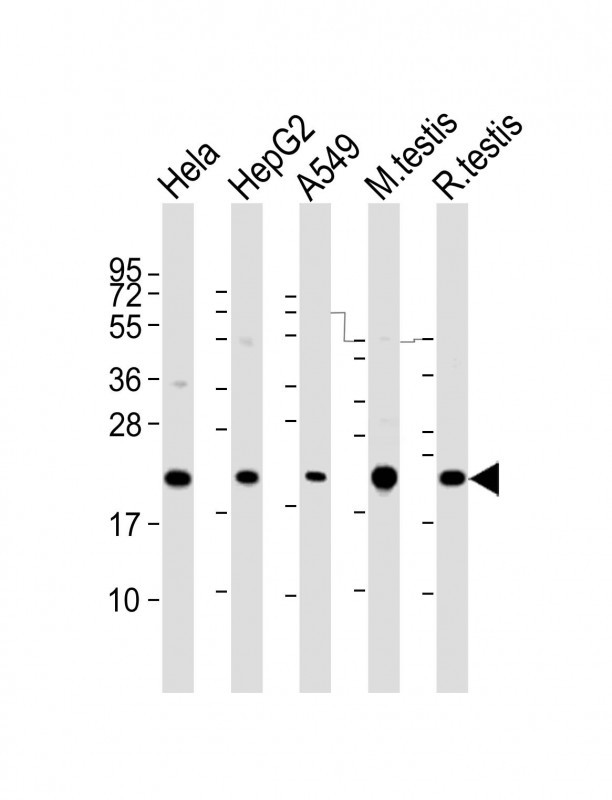PTGES3 Antibody (Center)
Affinity Purified Rabbit Polyclonal Antibody (Pab)
- SPECIFICATION
- CITATIONS
- PROTOCOLS
- BACKGROUND

Application
| WB, E |
|---|---|
| Primary Accession | Q15185 |
| Other Accession | P83868, Q9R0Q7, Q6PWL5, Q3ZBF7, NP_006592.3, G1TGF1 |
| Reactivity | Human, Mouse, Rat |
| Predicted | Bovine, Monkey, Rabbit |
| Host | Rabbit |
| Clonality | Polyclonal |
| Isotype | Rabbit IgG |
| Calculated MW | 18697 Da |
| Antigen Region | 45-73 aa |
| Gene ID | 10728 |
|---|---|
| Other Names | Prostaglandin E synthase 3, Cytosolic prostaglandin E2 synthase, cPGES, Hsp90 co-chaperone, Progesterone receptor complex p23, Telomerase-binding protein p23, PTGES3, P23, TEBP |
| Target/Specificity | This PTGES3 antibody is generated from rabbits immunized with a KLH conjugated synthetic peptide between 45-73 amino acids from the Central region of human PTGES3. |
| Dilution | WB~~1:2000 E~~Use at an assay dependent concentration. |
| Format | Purified polyclonal antibody supplied in PBS with 0.09% (W/V) sodium azide. This antibody is purified through a protein A column, followed by peptide affinity purification. |
| Storage | Maintain refrigerated at 2-8°C for up to 2 weeks. For long term storage store at -20°C in small aliquots to prevent freeze-thaw cycles. |
| Precautions | PTGES3 Antibody (Center) is for research use only and not for use in diagnostic or therapeutic procedures. |
| Name | PTGES3 |
|---|---|
| Synonyms | P23, TEBP |
| Function | Cytosolic prostaglandin synthase that catalyzes the oxidoreduction of prostaglandin endoperoxide H2 (PGH2) to prostaglandin E2 (PGE2) (PubMed:10922363). Molecular chaperone that localizes to genomic response elements in a hormone-dependent manner and disrupts receptor-mediated transcriptional activation, by promoting disassembly of transcriptional regulatory complexes (PubMed:11274138, PubMed:12077419). Facilitates HIF alpha proteins hydroxylation via interaction with EGLN1/PHD2, leading to recruit EGLN1/PHD2 to the HSP90 pathway (PubMed:24711448). |
| Cellular Location | Cytoplasm {ECO:0000250|UniProtKB:Q3ZBF7}. |

Thousands of laboratories across the world have published research that depended on the performance of antibodies from Abcepta to advance their research. Check out links to articles that cite our products in major peer-reviewed journals, organized by research category.
info@abcepta.com, and receive a free "I Love Antibodies" mug.
Provided below are standard protocols that you may find useful for product applications.
Background
Molecular chaperone that localizes to genomic response elements in a hormone-dependent manner and disrupts receptor-mediated transcriptional activation, by promoting disassembly of transcriptional regulatory complexes.
References
Chen, W., et al. Proc. Natl. Acad. Sci. U.S.A. 107(16):7401-7406(2010)
Lee, J.H., et al. Cancer Lett. 290(1):76-86(2010)
Chadli, A., et al. J. Biol. Chem. 285(6):4224-4231(2010)
Woo, S.H., et al. J. Biol. Chem. 284(45):30871-30880(2009)
Mattila, S., et al. Neuropathology 29(2):156-165(2009)
If you have used an Abcepta product and would like to share how it has performed, please click on the "Submit Review" button and provide the requested information. Our staff will examine and post your review and contact you if needed.
If you have any additional inquiries please email technical services at tech@abcepta.com.













 Foundational characteristics of cancer include proliferation, angiogenesis, migration, evasion of apoptosis, and cellular immortality. Find key markers for these cellular processes and antibodies to detect them.
Foundational characteristics of cancer include proliferation, angiogenesis, migration, evasion of apoptosis, and cellular immortality. Find key markers for these cellular processes and antibodies to detect them. The SUMOplot™ Analysis Program predicts and scores sumoylation sites in your protein. SUMOylation is a post-translational modification involved in various cellular processes, such as nuclear-cytosolic transport, transcriptional regulation, apoptosis, protein stability, response to stress, and progression through the cell cycle.
The SUMOplot™ Analysis Program predicts and scores sumoylation sites in your protein. SUMOylation is a post-translational modification involved in various cellular processes, such as nuclear-cytosolic transport, transcriptional regulation, apoptosis, protein stability, response to stress, and progression through the cell cycle. The Autophagy Receptor Motif Plotter predicts and scores autophagy receptor binding sites in your protein. Identifying proteins connected to this pathway is critical to understanding the role of autophagy in physiological as well as pathological processes such as development, differentiation, neurodegenerative diseases, stress, infection, and cancer.
The Autophagy Receptor Motif Plotter predicts and scores autophagy receptor binding sites in your protein. Identifying proteins connected to this pathway is critical to understanding the role of autophagy in physiological as well as pathological processes such as development, differentiation, neurodegenerative diseases, stress, infection, and cancer.


